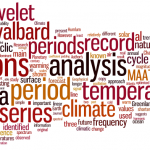… if your data do not look like a quadratic!
This is a post about global sea-level rise, but I put that message up front so that you’ve got it even if you don’t read any further.
The reputable climate-statistics blogger Tamino, who is a professional statistician in real life and has published a couple of posts on this topic, puts it bluntly:
Fitting a quadratic to test for change in the rate of sea-level rise is a fool’s errand.
I’d like to explain why, with the help of a simple example. Imagine your rate of sea-level rise changes over 100 years in the following way:
[Read more…] about Don’t estimate acceleration by fitting a quadratic…
